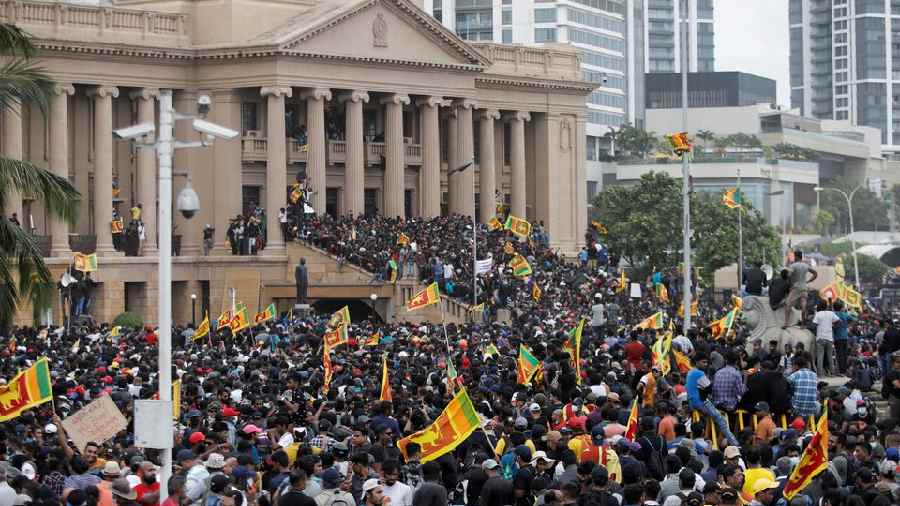The woman stood in line for more than 14 hours for a passport, desperate to escape the economic crisis engulfing Sri Lanka. Selwi Thangawelu, a Sri Lankan housewife, has secured a job as a housekeeper in Kuwait, money she needs for her two children’s school fees and books.
Her husband’s job as a city garbage collector is no longer enough to pay for food and fuel, the price of which has soared in recent weeks as the country’s situation grows increasingly dire. F o r t h r e e w e e k s , Thangawelu and her husband have survived on rice, saving the vegetables they can afford for the children.
“I am a little scared,” she said, “but there’s no way to stay.” Sri Lanka was once an economic hope, with a highly educated populace, a growing middle class, and median incomes among the highest in South Asia. Now, most people are living on the edge, unable to buy even the basics. Grocery shelves are barren, and what food is available is increasingly unaffordable.
Fuel supplies are so low that people wait in line for four days for a few litres of petrol. Some people are marooned at home, while others travel long distances on foot. “This is the first time in my life that it is so hard,” said Deyarathna Liyanage, an 80-year-old farmer. And his family is among the more fortunate.
At a time when many in the country are going hungry, they can subsist on their vegetable garden, banana trees, and rice from a small piece of paddy. “There’s nothing to eat. There’s no petrol. We can’t go anywhere,” he added.
“There’s nothing at all.” The economic crisis came to a head this weekend, as thousands of people stormed the official residence and office of the President, Gotabaya Rajapaksa, demanding his resignation. A breakaway mob burned down the private home of the unpopular Prime Minister, Ranil Wickremesinghe.
Ordinary Sri Lankans are paying the price for government mismanagement and missteps. Liyanage used to contribute to the family’s income by selling rice, which he grew using chemical fertilisers from the government. Then the government banned fertilisers overnight, battering harvests. After the policy was lifted, the price of fertiliser soared. He now uses compost, which he said results in yields only about a fifth of what he used to harvest.
“Before there was a good profit from rice,”he said. “Now, it’s a loss if we sell it, but it’s still cheaper to grow than to buy.” The streets of Colombo are mostly empty of cars now, except for thoseparked in lines stretching several city blocks waiting for a turn at a fuel pump. After waiting two days to gas up his car, Liyanage’sson, Indika, was 199th in a line more than a mile long.
Frustrated, he decided to give up and walk to his home inHabarakada, a village on the outskirts of Colombo. Paramasivam Satheesh, 36, has driven an auto-rickshawfor 15 years. Conditions have got so bad that he has stopped picking up fares. In the last two weeks, with supplies scarce and expensive, he has used the little fuel he has left to drive his wife, Ganesan Kajanthiny, 35, and their 5-year old son, Magadheesh, to GalleFace, an ocean-front park.
There they can pick up free food from the makeshift protest camp that has operated for months. Satheesh is wary of the protest winding up too soon. “If they stop giving it, we’ll have to beg on the road,” he said. His plan, if Sri Lanka’sfuel shortage eases, is to start picking up fares again, to earn enough money to apply for a passport. He could then look for work as a welder in Europe or West Asia. Glancing at his wife, Kajanthiny, in the backseat, he said, “she can manage alone”.
New York Times News Service










